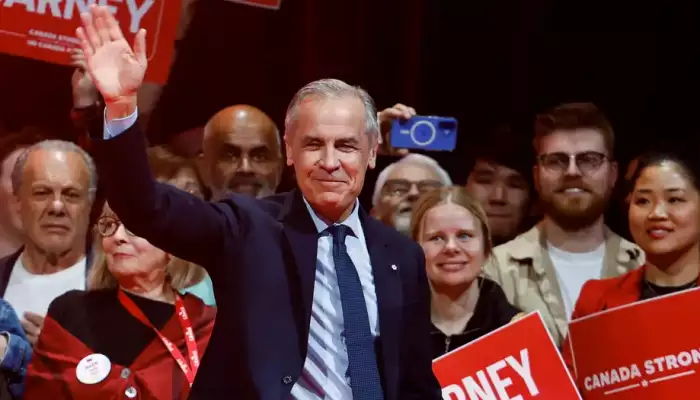
Prime Minister Mark Carney's Liberal party won Canada's federal election, according to Tuesday projections by Canadian broadcasters CTV and CBC News.
Opposition leader Pierre Poilievre conceded defeat after failing to bring an end to the dominance of the Liberal Party, but did not suggest he would step down saying that the Conservatives had increased their number of seats by more than 20.
It was not yet clear if the Liberals would secure the 172 out of 343 electoral seats needed for a majority, reported CBC. The Liberals were leading in 161 districts with the Conservatives leading in 150.
CTV news predicted Carney would not get the majority he wanted to better negotiate trade deals with Trump.
This marks a comeback for the Liberals, whose popularity had suffered before former Prime Minister Justin Trudeau stepped down in January this year.
The Bloc Quebecois, a separatist party that seeks independence for Quebec was projected to come in third.
The New Democratic Party (NDP), which was part of the ruling coalition for four years, saw its support plummet, going from 24 seats to a projected eight. Their leader Jagmeet Singh said he planned to step down after an interim leader was named.
Singh congratulated Carney on his victory as he himself lost his seat in parliament. A lot of the NDP's supporters shifted to the Liberals as US President Donald Trump's tariffs and comments about making Canada a US state weighed on the minds of voters.
What did Carney say after his election win?
Following his victory, Carney told his supporters that Canada will "win this trade war" with the US.
"We are over the shock of the American betrayal, but we should never forget the lessons," Carney said, warning that there were challenging days ahead.
"As I've been warning for months, America wants our land, our resources, our water, our country," Carney said. "These are not idle threats. President Trump is trying to break us so America can own us."
"That will never ... ever happen. But we also must recognize the reality that our world has fundamentally changed."
European Commission President Ursula von der Leyen congratulated Carney on his victory and said the bond between Europe and Canada was growing stronger.
"The bond between Europe and Canada is strong — and growing stronger. I look forward to working closely together, both bilaterally and within the G7. We'll defend our shared democratic values, promote multilateralism, and champion free and fair trade," she posted on X.
Britain's Prime Minister Keir Starmer also expressed his congratulations in a statement. "Our partnership is based on shared history and values, with a shared sovereign, and I look forward to strengthening our ties," he said, calling their two nations "the closest of allies, partners and friends."
Why did Carney call a snap election?
Carney was elected by the Liberals to replace Trudeau, but called for an election just nine days after taking office to seek a "strong, positive mandate" amid the general unpopularity of his party.
He was facing off against Conservative Pierre Poilievre who had been high in the polls before Trudeau stepped down. However, a series of factors, perhaps most significantly antagonism from Canada's powerful neighbor, gave Carney a historic boost of popularity.
Around 29 million Canadians voted in the country's snap election. The first polling stations to open in the massive G7 country that spans six time zones were in the Atlantic province of Newfoundland and Labrador.
A record 7.3 million votes were cast before election day.
The country has been facing a cost-of-living crisis, and Trump's threats to impose tariffs look likely to hit the country's economy even further.
With 75% of Canada's exports going to the US, both candidates said they would accelerate efforts to strike a free trade deal between the country and its southern neighbor.
Trump statements take center stage
The statements byTrump about Canada becoming the US' 51st state have played a role during the campaign. Trump also repeated the call on election day.
"Look how beautiful this land mass would be. Free access with NO BORDER," Trump posted on his Truth Social account.
Canadian Prime Minister Carney has repeatedly rejected the idea.